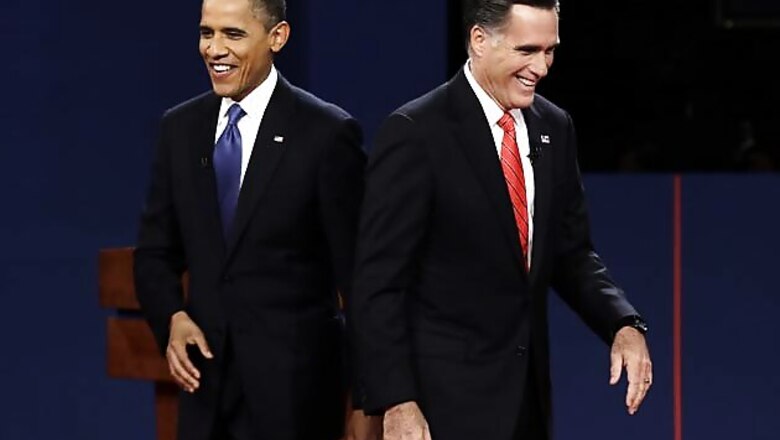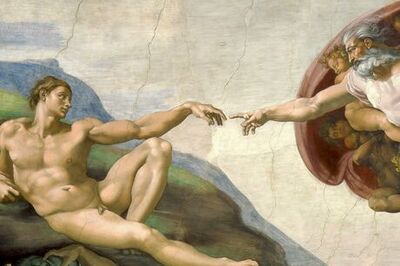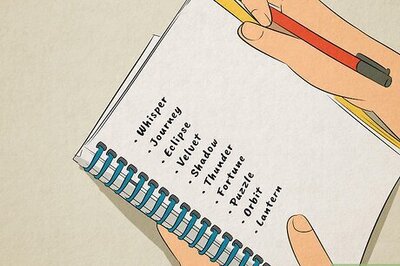
views
Washington: US President Barack Obama and Republican rival Mitt Romney launched a frenzied final weekend of campaigning on Saturday seeking an edge in a handful of battleground states that will decide the outcome of a tight presidential race that is going down to the wire.
National opinion polls showed a race for the popular vote so close that only a statistically insignificant point or two separated the two rivals. Soundings in the nine remaining battleground states tightened after Obama's poor performance in the first presidential debate, on October 3, and stayed that way.
Yet Republicans quietly acknowledged that Romney had so far been unable to achieve the breakthroughs needed such pivotal states as Ohio and Wisconsin. That leaves Romney with the tougher path to reach the required 270 electoral votes. He must win more of the nine most-contested swing states that are not reliably Republican or Democratic: Ohio, Florida, Virginia, North Carolina, Colorado, Nevada, Wisconsin, Iowa and New Hampshire.
After holding mostly small and mid-size rallies for much of the campaign, Obama's team is planning a series of larger events this weekend aimed at drawing big crowds in battleground states. Still, the campaign isn't expecting to draw the massive audiences Obama had in the closing days of the 2008 race, when his rallies drew more than 50,000.
Obama's closing weekend also includes two joint events with former president Bill Clinton – a rally on Saturday night in Virginia and an event on Sunday in New Hampshire. The two presidents had planned to campaign together across three states earlier this week, but that trip was called off because of superstorm Sandy. And, of course, there is always Ohio, the top battleground of them all.
Not to be outdone, Romney hosted a massive rally Friday night in West Chester, Ohio, drawing more than 10,000 people to the Cincinnati area for an event that featured rock stars, sports celebrities and dozens of Republican officials. It was a high-energy event on a cold night designed to kick off his own sprint to the finish.
Romney arrived in New Hampshire close to midnight on Friday after an 18-hour day on the campaign trail that took him from Virginia to Wisconsin to Ohio. He was attending a morning rally on the New Hampshire seacoast before making an afternoon appearance in Iowa, and two more in Colorado. He shifted an original plan to campaign in Nevada on Sunday in favor of a schedule likely to bring him back to Iowa, Ohio, Pennsylvania and Virginia.
Aides stress that his schedule is fluid and may change with little notice as they evaluate where his time is best spent.
On Saturday, Obama's first stop was in Mentor, Ohio, then he was campaigning in Milwaukee and Dubuque, Iowa, and ending the day in Bristow, Virginia. On Sunday, he was taking his campaign to New Hampshire, Florida, Colorado and, yes, Ohio.
Looking elsewhere for electoral votes, Romney and his allies sought to expand the political map into Pennsylvania and, to a lesser extent, Minnesota and Michigan. Obama's aides expressed confidence about all three, although some private Democratic polls showed relatively close contests and the two sides engaged in a late advertising war.
Romney's foray into Pennsylvania is not folly. Unlike states that emphasize early voting, Pennsylvania will see most votes cast on Election Day. The state has not been saturated with political advertising, giving Romney and his supporting groups - still flush with cash - an opportunity to sway last-minute voters with a barrage of commercials. Obama is countering by buying commercial time in the state as well and is sending Clinton into the state to campaign for him.
Under the US system, the nationwide popular vote does not determine the winner. Romney and Obama are actually competing to win at least 270 electoral votes in state-by-state contests. Those electoral votes are apportioned to states based on a mix of population and representation in Congress. It takes 270 of the 538 electoral votes to win the presidency.
The final frenzy of campaigning comes in the wake of Superstorm Sandy that has dominated much of the news coverage for the past several days as New York, New Jersey and Connecticut recover from the brunt of its force.
Friday offered an economic finale to the campaign with the release of October jobs reports that contained better than average economic news but gave both campaigns a talking point. Employers added a better-than-expected 171,000 jobs last month, but the jobless rate ticked up to 7.9 percent from 7.8 percent - mainly because more people jumped back into the search for work.
The economy has trumped all other issues in a campaign carried out in the shadow of slow growth, high unemployment and huge federal deficits.
"The question of this election is, 'Do you want four years of the same or do you want real change?'" Romney asked an audience in West Allis, Wisconsin, on Friday. He said, correctly, that unemployment is higher than when Obama took office, and he contended the president would fail to improve the economy with a second term. "Four more days," his supporters chanted.
Romney, the former CEO of a private equity firm, said an Obama presidency would mean more broken relations with Congress, showdowns over government shutdowns, a chilling effect on the economy and perhaps "another recession."
Obama countered that more than 5 million jobs have been created since the depths of the Great Recession. He ended the campaign as he began it, insisting the election wasn't a referendum on his performance in office, but a choice between him and his rival. It's "between going back to the top-down policies that crashed our economy or adapting the kinds of policies that will make sure we've got a strong and growing middle class," the incumbent said Friday in Hilliard, Ohio.
Obama will face voters with the highest unemployment rate of any incumbent since Franklin Roosevelt during the Great Depression of the 1930s.
While Friday's jobs report was unlikely to affect the election outcome, it brought the economy back into the national conversation in a country still preoccupied with the devastation wrought by Superstorm Sandy on the US East Coast.
Obama paused his campaigning for three days this week to manage the federal response to the natural disaster. Romney muted criticism of the president during those days for fear of appearing to seek political advantage while Americans were suffering, and his campaign watched awkwardly as a once-prominent Obama critic, New Jersey's Republican Gov. Chris Christie, praised the president and toured storm damage with him.
Obama, who responded to recession with a roughly $800 billion stimulus plan and expanded the auto industry bailout begun under President George W. Bush, wants to raise taxes on the wealthy and ensure they pay 30 percent of their income at minimum. To create jobs, he would push to steer money toward infrastructure projects, energy development, education and worker training, manufacturing support and infrastructure.
Romney firmly opposes raising taxes on families. He has pledged to keep Bush-era tax cuts for all incomes and drop all tax rates further. He also promises to cut $500 billion per year from the federal budget by 2016, although he has been under pressure to explain how he will accomplish that while also lowering taxes. Romney pledges to curtail deductions, credits and exemptions for the wealthiest, but he has not provided specifics.
About 25 million people have already voted in 34 states and the District of Columbia. Obama holds an apparent lead over Romney in key states. But Obama's advantage is not as big as the one he held over John McCain in the 2008 race, giving Romney hope that he could make up that gap in Tuesday's election.
No votes will be counted until Election Day, but several battleground states are releasing the party affiliation of people who have voted early. So far, Democratic voters outnumber Republicans in Florida, Iowa, Nevada, North Carolina and Ohio. Republicans have the edge in Colorado.















Comments
0 comment